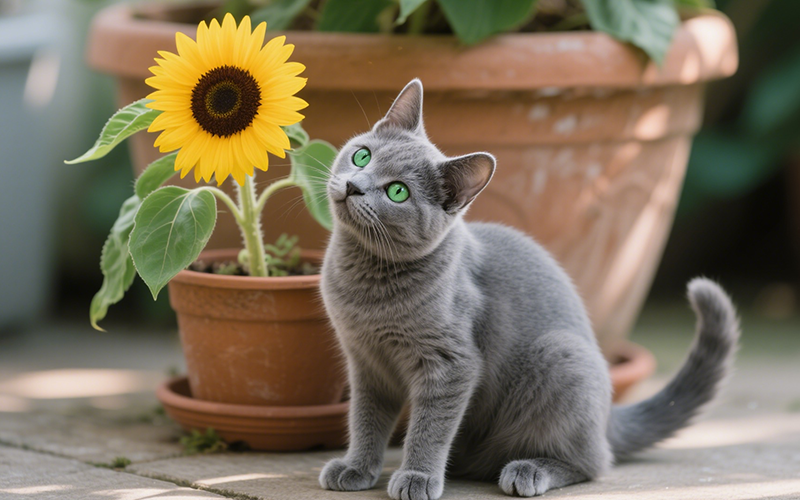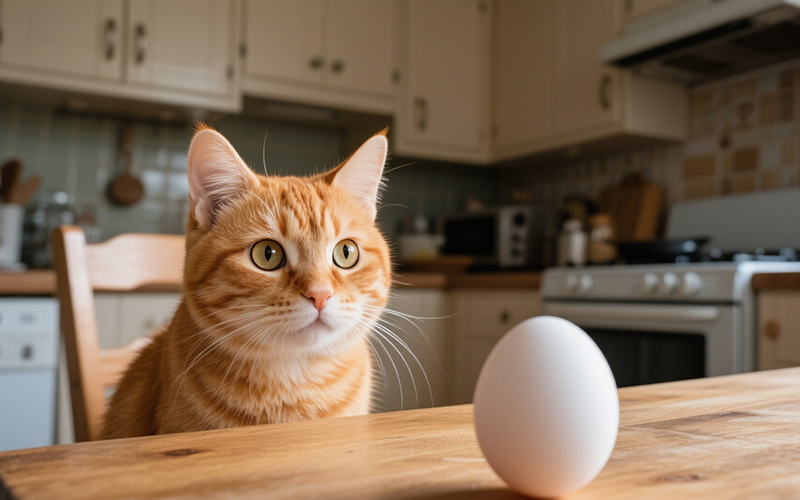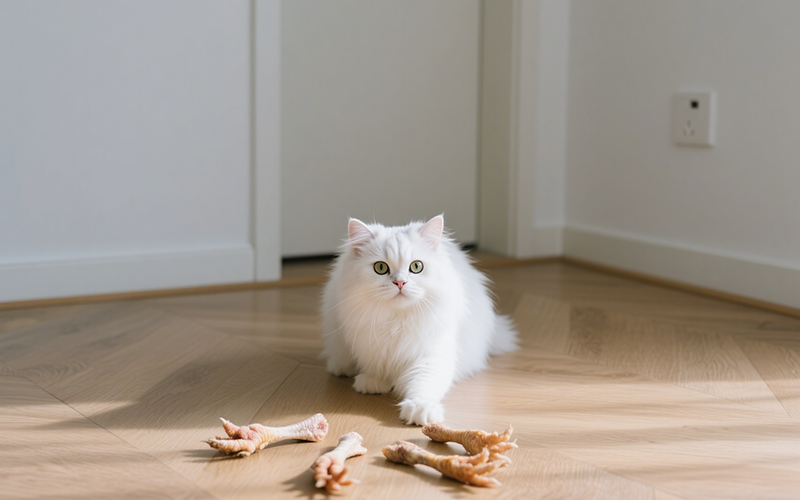Can Cats Eat Sunflowers? Unraveling Fact from Fiction for Feline Safety
- 9 May 2025 09:26
Sunflowers, with their bright, cheerful faces, are a beloved sight in gardens and bouquets. Their seeds are a popular snack for humans and birds alike. This might lead cat owners to wonder, especially if their feline friend shows curiosity towards these plants: can cats eat sunflowers? Are the petals, leaves, stems, or seeds safe for them, or do they pose a hidden threat?
The good news is that **true sunflowers (Helianthus annuus) are generally considered non-toxic to cats by major veterinary organizations like the ASPCA.** This means that if your cat nibbles on a petal, leaf, or even a couple of shelled seeds, it's unlikely to cause severe poisoning. However, "non-toxic" doesn't equate to "completely harmless" or "nutritionally beneficial," and there are important caveats to consider, especially regarding seeds and large ingestions of plant matter.
This comprehensive guide, grounded in veterinary expertise and adhering to EEAT (Expertise, Authoritativeness, Trustworthiness) principles, will explore the different parts of the sunflower plant and their safety for cats. We'll delve into potential risks associated with seeds, the lack of nutritional value from plant parts, and what to do if your cat ingests sunflowers. Our aim is to provide clear, reliable information to help you ensure your cat's well-being.

Understanding the Sunflower Plant: Parts and Considerations
To discuss safety, it's important to break down the sunflower plant:
Petals (Ray Florets): The bright yellow (or sometimes red/orange) "petals" surrounding the central disc.
Leaves: The large, green, somewhat rough leaves along the stem.
Stem: The thick, fibrous stalk supporting the flower head.
Central Disc Florets: The tightly packed tiny flowers in the center where the seeds develop.
Sunflower Seeds:
In the Shell: The hard, striped outer shell (hull) with the kernel (seed meat) inside.
Shelled Seeds (Kernels): The edible inner part of the seed.
Different parts of the plant pose different (or minimal) risks.
Are Sunflower Plants (Petals, Leaves, Stems) Toxic to Cats?
According to the ASPCA and other reliable veterinary sources, the **sunflower plant itself (Helianthus annuus) – including its petals, leaves, and stems – is considered non-toxic to cats.** This means that incidental ingestion of small amounts of these plant parts is unlikely to cause systemic poisoning.
However, even non-toxic plant matter can cause issues if a cat eats a significant amount:
Gastrointestinal Upset: Cats are obligate carnivores and their digestive systems are not designed to process large quantities of plant material. Eating too many leaves or petals can lead to:This is usually due to the indigestible fiber and the cat's inability to break down cellulose effectively.
Vomiting
Diarrhea
Mild stomach discomfort
Potential for Mild Irritation: The rough texture of sunflower leaves might cause mild oral irritation if chewed excessively, but this is uncommon.
Pesticide/Herbicide Residue: If the sunflowers have been treated with chemicals, ingesting any part of the plant could expose your cat to these harmful substances. This is a concern for any plant, toxic or not. It's always best if cats only have access to plants you know are chemical-free.
So, while the plant material isn't poisonous, it's not a food item and can still cause minor problems if over-consumed. The answer to "can cats eat sunflowers (the plant parts)?" is yes, they are non-toxic, but ingestion should still be discouraged or limited to tiny nibbles.
What About Sunflower Seeds for Cats? Shelled vs. Unshelled
Sunflower seeds are where the conversation gets a bit more nuanced, though they too are generally considered non-toxic.
Shelled Sunflower Seeds (Kernels)
Non-Toxic: The inner kernel of a sunflower seed is not poisonous to cats.
High in Fat: Sunflower seeds are very high in fat (mostly healthy unsaturated fats for humans, but still concentrated fat for cats).
High in Calories: Due to the high fat content, they are calorie-dense.
Nutritional Content: They contain Vitamin E (an antioxidant), some B vitamins, magnesium, and selenium.
Risks of Shelled Seeds:
Gastrointestinal Upset: The high fat content can cause digestive upset (vomiting, diarrhea) if a cat eats too many.
Pancreatitis Risk: High-fat foods can be a trigger for pancreatitis in susceptible cats, a painful and potentially serious inflammation of the pancreas.
Obesity: Regular consumption of high-calorie seeds can contribute to weight gain.
Added Salt/Flavorings: Sunflower seeds prepared for human consumption are often salted or flavored with ingredients (like onion or garlic powder) that are harmful or toxic to cats. **Only plain, unsalted, unshelled kernels should ever be considered, and even then, with extreme caution.**
Conclusion on Shelled Seeds: A tiny piece of a plain, unsalted sunflower kernel occasionally is unlikely to harm most cats. However, they are not a recommended treat due to the high fat and calorie content and the risk of GI upset or pancreatitis if too many are given.
Unshelled Sunflower Seeds (Seeds in the Shell)
Non-Toxic Kernel: The kernel inside is non-toxic, as above.
Indigestible Shell: The hard outer shell (hull) is made of fibrous material that cats cannot digest.
Risks of Unshelled Seeds:
Choking Hazard: The hard shells can be a choking hazard, especially if a cat tries to swallow them whole or if pieces break off sharply.
Gastrointestinal Obstruction/Irritation: The indigestible shells can cause irritation to the digestive tract. If a cat consumes many shells, they could potentially accumulate and contribute to an intestinal blockage, though this is less common than with larger or denser foreign objects. Sharp pieces of shell could also theoretically cause internal abrasions.
Digestive Upset: Even if they pass through, the shells can cause vomiting or diarrhea.
Conclusion on Unshelled Seeds: These pose more mechanical risks due to the shells. Cats should generally not be allowed to eat sunflower seeds in their shells. If they happen to crunch one open and eat the kernel while spitting out most of the shell, the risk is lower, but it's not ideal.
Why Might Cats Be Attracted to Sunflowers or Their Seeds?
Cats are naturally curious creatures. Their interest in sunflowers might stem from:
Movement: Leaves or petals swaying in a breeze can attract their attention.
Texture: They might enjoy batting at or chewing on the leaves or petals for sensory stimulation.
Novelty: A new plant in the house or garden is something to investigate.
Seeds: If seeds are falling from a bird feeder or the flower head, a cat might be drawn to the small, movable objects or even the oily scent of the kernels.
Pica: Rarely, an excessive desire to eat non-food items (like plant matter or seeds) can indicate an underlying medical or nutritional issue.
Nutritional Value of Sunflowers for Cats? Minimal to None
While sunflower plants are non-toxic and seeds contain some nutrients, they do not offer significant or necessary nutritional benefits for cats, who are obligate carnivores.
Plant Parts (Petals, Leaves, Stems): Offer virtually no digestible nutrition for cats. They are mostly fiber and water.
Sunflower Seed Kernels: While containing fats, Vitamin E, and some minerals, these are better obtained from a cat's balanced, species-appropriate diet. The high fat content is more of a risk than a benefit when given as a treat.
Cats should get their essential nutrients from high-quality commercial cat food or a properly formulated homemade diet (under veterinary nutritionist guidance).
What to Do If Your Cat Eats Part of a Sunflower or Its Seeds
If you find your cat has ingested part of a sunflower plant or some seeds:
Don't Panic (Usually): As true sunflowers are non-toxic, a small ingestion is often not an emergency.
Identify What Was Eaten and How Much:
Was it petals, leaves, stem, shelled seeds, or seeds in the shell?
Estimate the quantity. A nibble of a leaf is different from eating multiple seeds with shells.
Remove Access: Prevent further ingestion.
Monitor Your Cat: For the next 24-48 hours, watch for any signs of illness:
Vomiting
Diarrhea
Lethargy
Loss of appetite
Abdominal discomfort
Straining to defecate (if shells were ingested)
Signs of choking (if shells were ingested, though this would usually be immediate)
When to Contact Your Veterinarian:
If your cat ingested a large amount of plant material or many sunflower seeds (especially with shells).
If your cat is showing any signs of illness, particularly persistent vomiting or diarrhea, or signs of abdominal pain.
If you know the sunflower seeds were salted or flavored with potentially harmful ingredients (like onion or garlic powder).
If your cat has a history of sensitive stomach, pancreatitis, or other GI issues.
If you are concerned for any reason. It's always better to be safe.
If your cat ate just a tiny piece of a petal or a single shelled seed kernel (plain, unsalted), they will most likely be fine. The primary concern is with larger quantities or ingestion of shells.
Important Distinction: "Lily" Confusion and True Lilies
It's crucial to note that while true sunflowers (Helianthus annuus) are non-toxic, **many plants commonly referred to as "lilies" are EXTREMELY TOXIC and potentially fatal to cats.** This includes true lilies (Lilium species) and daylilies (Hemerocallis species). All parts of these lilies – petals, leaves, stem, pollen, and even the water in their vase – are dangerous. Ingestion of even a tiny amount can cause acute kidney failure.
Always be 100% certain of plant identification if your cat has access to plants or flowers. If there's any doubt, assume it's dangerous and keep it away from your cat. Sunflowers look very different from true lilies, but it's a critical point of safety for all cat owners.
Table: Sunflower Parts and Cat Safety - A Quick Guide
This table summarizes the safety aspects:
| Sunflower Part (Helianthus annuus) | Safety for Cats | Primary Considerations/Risks |
| Petals | Non-Toxic | Mild GI upset if many eaten; pesticide risk. |
| Leaves | Non-Toxic | Mild GI upset if many eaten; rough texture; pesticide risk. |
| Stems | Non-Toxic | Fibrous, indigestible; mild GI upset if many eaten; pesticide risk. |
| Shelled Seed Kernels (Plain, Unsalted) | Non-Toxic, but Use Extreme Caution | High fat/calories (GI upset, pancreatitis risk, obesity); avoid salted/flavored. A tiny piece occasionally is likely fine. |
| Unshelled Seeds (Seeds in Shell) | Not Recommended | Shells are indigestible (GI upset, potential obstruction, choking hazard). |
| Answering "can cats eat sunflowers"? | Plant parts: Yes (non-toxic, but discourage eating). Seeds: Kernels cautiously, shells no. | Prioritizes safety and practical advice. |
Safe Alternatives for Plant-Curious Cats
If your cat enjoys nibbling on greens, provide them with safe, cat-specific options:
Cat Grass: Grow or buy pots of wheat, oat, rye, or barley grass. This is the safest way for them to satisfy their craving for greens.
Catnip: Fresh or dried, many cats enjoy this herb.
Silver Vine Sticks: Another natural plant product that can provide enrichment.
Certain Cat-Safe Herbs (in moderation): A tiny pinch of fresh parsley or dill might be okay for some cats, but always research specific herbs.
The Veterinary Perspective: Non-Toxic but Not a Treat
Veterinarians confirm that true sunflowers (Helianthus annuus) are non-toxic to cats. However, they generally advise:
Discouraging Plant Eating: It's best to discourage cats from eating any houseplants or garden plants, even non-toxic ones, to prevent GI upset and to avoid confusion with toxic plants.
Seeds with Caution: They would advise against shells and recommend only tiny amounts of plain, unsalted kernels very infrequently, if at all, due to the fat content.
Prioritizing Species-Appropriate Diet: A cat's nutrition should come from balanced cat food.
Awareness of Pesticides: Any outdoor plant can carry chemical residues.
The main message is usually one of caution and emphasizing that plant matter and seeds are not part of an ideal feline diet.
Need Quick Pet Info? The PettureX App Can Help
When questions arise about your pet's interaction with plants or other household items, or if they exhibit unusual symptoms, having a quick information resource can be invaluable.
The PettureX app is an AI-powered tool designed to support pet owners:
Image Recognition: Can help identify plants your cat may have nibbled (always confirm with reliable poison control resources or your vet, especially if toxicity is a concern).
Pet Health Analysis via Image: Upload images of symptoms for preliminary AI insights (this is not a diagnostic tool and doesn't replace a vet visit).
24/7 AI Vet Consultation: Get instant AI-driven responses to urgent questions like, "My cat ate a sunflower leaf, is it dangerous?" This can provide immediate guidance on assessing risk and determining appropriate next steps while you decide whether to contact your veterinarian.
PettureX is a supplementary tool. It does not replace professional veterinary diagnosis, advice, or treatment. Always consult your vet for your pet's specific health needs.
Conclusion: Sunflowers Are Generally Safe, But Caution is Still Key
To definitively answer "can cats eat sunflowers?" – yes, the true sunflower plant (Helianthus annuus) is considered non-toxic to cats. Nibbling on petals, leaves, or stems is unlikely to cause poisoning, though it can lead to mild digestive upset if a lot is consumed.
Regarding sunflower seeds:
Plain, unsalted, shelled kernels are non-toxic but very high in fat and calories; offer only a tiny piece very rarely, if at all.
Unshelled seeds (with the hard hull) should be avoided due to choking and digestive obstruction risks.
Key Takeaways:
True sunflower plants (petals, leaves, stems) are non-toxic to cats.
Large ingestions of plant matter can still cause mild GI upset.
Shelled sunflower seed kernels (plain, unsalted) are non-toxic but high in fat; give extremely sparingly.
Avoid unshelled sunflower seeds due to the indigestible hulls.
Ensure any accessible plants are free from pesticides.
Always distinguish true sunflowers from highly toxic lilies.
Provide safe alternatives like cat grass if your cat enjoys chewing greens.
While it's reassuring to know that sunflowers aren't poisonous, it's always best to encourage your cat to get their nutrition from their balanced cat food and to offer species-appropriate treats. Keep plants, even non-toxic ones, generally out of reach to prevent over-consumption and potential digestive issues.
Related

Can Cats Eat Dog Kibble? Unpacking the Nutritional Mismatch!
- 29 May 2025
Can Cats Eat Deli Turkey? Slicing Through the Facts for Your Feline!
- 29 May 2025
Can Cats Eat Deer Meat? Exploring Venison for Your Feline!
- 28 May 2025
Can Cats Eat Corned Beef? Unpacking This Salty Human Delicacy!
- 28 May 2025
Can Cats Eat Cooked Rice? The Grain Truth for Your Feline Friend!
- 27 May 2025
Can Cats Eat Cornbread? A Crumb of Truth for Curious Cat Owners!
- 27 May 2025
Can Cats Eat Cooked Meat? Sizzling Facts for Your Feline's Feast!
- 26 May 2025
Can Cats Eat Chili? Spicing Up the Truth About This Human Dish!
- 26 May 2025
Can Cats Eat Chicken Eggs? Cracking the Code on This Feline Food Query!
- 24 May 2025
Can Cats Eat Chicken Feet? A Paw-sitive or Negative Treat?
- 24 May 2025
